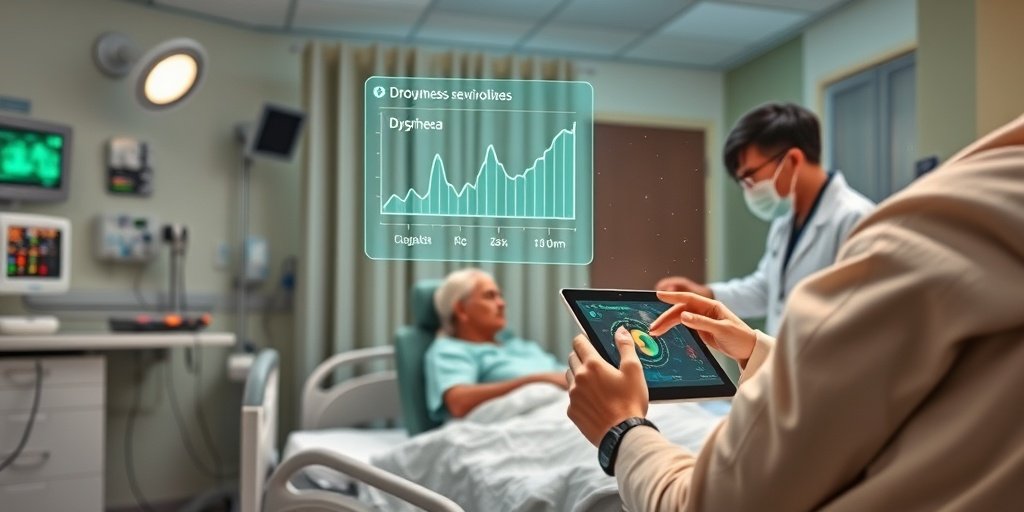⚡ Quick Summary
This study developed machine learning (ML) systems to predict future symptom deterioration in cancer patients, utilizing data from over 15,000 treatments. The systems demonstrated promising performance, with AUROC values ranging from 0.66 to 0.73, indicating their potential for guiding personalized interventions in cancer care.
🔍 Key Details
- 📊 Dataset: 3,229 patients, 20,267 treatments at Princess Margaret Cancer Centre; 12,079 patients, 77,003 treatments in external validation.
- 🧩 Symptoms predicted: Nine patient-reported symptoms, including dyspnea and drowsiness.
- ⚙️ Technology: Machine learning algorithms trained on electronic health record (EHR) data.
- 🏆 Performance: AUROC for dyspnea: 0.66; drowsiness: 0.73 in internal testing; external validation showed AUROCs from 0.67 to 0.73.
🔑 Key Takeaways
- 🤖 ML systems can effectively predict symptom deterioration in cancer patients.
- 📈 AUROC values indicate varying predictive performance across different symptoms.
- 🔍 High-risk treatments were significantly linked to future symptom deterioration.
- 🌍 External validation across 82 cancer centers confirmed the robustness of the ML models.
- 💡 Heterogeneity in performance across centers highlights the need for tailored deployment strategies.
- 🏥 Potential for personalized interventions based on predicted symptoms could enhance patient care.
- 📅 Study timeframe: Data collected from treatments over a defined period.
- 🆔 PMID: 40997295.

📚 Background
Cancer treatment often leads to a range of debilitating symptoms that can significantly affect patients’ quality of life. Traditional methods of symptom monitoring can be inconsistent and subjective. The integration of machine learning into healthcare offers a promising avenue for more accurate and timely predictions of symptom deterioration, potentially leading to improved patient outcomes.
🗒️ Study
Conducted at the Princess Margaret Cancer Centre, this study aimed to develop and validate ML systems that predict symptom deterioration among cancer patients. By analyzing data from internal EHRs, the researchers focused on nine specific symptoms reported by patients undergoing treatment for aerodigestive cancers.
📈 Results
The ML systems demonstrated varying levels of predictive accuracy, with AUROC values ranging from 0.66 for dyspnea to 0.73 for drowsiness in the internal test cohort. In the external validation cohort, AUROCs ranged from 0.67 to 0.73, indicating a consistent ability to predict symptom deterioration across different healthcare settings.
🌍 Impact and Implications
The findings from this study have significant implications for cancer care. By utilizing ML to predict symptom deterioration, healthcare providers can implement personalized interventions that address patients’ specific needs. This approach not only enhances patient care but also optimizes resource allocation within healthcare systems, potentially reducing emergency department visits and improving overall patient satisfaction.
🔮 Conclusion
This study highlights the transformative potential of machine learning in oncology. By accurately predicting future symptoms from routine EHR data, healthcare professionals can provide more tailored and effective care for cancer patients. As we move forward, it is crucial to consider the heterogeneous performance of these systems across different centers to ensure their successful implementation in diverse healthcare environments.
💬 Your comments
What are your thoughts on the use of machine learning for predicting cancer-related symptoms? We would love to hear your insights! 💬 Leave your comments below or connect with us on social media:
Development of Machine Learning Systems to Predict Cancer-Related Symptoms With Validation Across a Health Care System.
Abstract
PURPOSE: Cancer and its treatment cause symptoms. In this study, we aimed to develop machine learning (ML) systems that predict future symptom deterioration among people receiving treatment for cancer and then validate the systems in a simulated deployment across an entire health care system.
METHODS: We trained and tested ML systems that predict a deterioration in nine patient-reported symptoms within 30 days after treatments for aerodigestive cancers, using internal electronic health record (EHR) data at Princess Margaret Cancer Centre (3,229 patients; 20,267 treatments). The primary performance metric was the area under the receiver operating characteristic curve (AUROC). The best-performing systems in the held-out internal test set were then externally validated across 82 cancer centers in Ontario (12,079 patients; 77,003 treatments) by adapting techniques from meta-analysis.
RESULTS: The best ML systems predicted symptom deterioration with AUROCs ranging from 0.66 (95% CI, 0.63 to 0.69) for dyspnea to 0.73 (95% CI, 0.71 to 0.75) for drowsiness in the internal test cohort. Treatments flagged as high-risk were significantly associated with future symptom deterioration (odds ratios [ORs], 2.53-6.56; all P < .001) and emergency department visits for dyspnea (OR, 1.85; P = .008), depression (OR, 1.84; P = .04), and anxiety (OR, 2.66; P < .001). In the external validation cohort, the AUROCs for different symptoms meta-analyzed across centers ranged from 0.67 (95% CI, 0.66 to 0.68) to 0.73 (95% CI, 0.72 to 0.74). Performance across centers displayed significant heterogeneity for six of nine symptoms (I2, 46.4%-66.9%; P = .004 for dyspnea, P < .001 for the rest).
CONCLUSION: ML can predict future symptoms among people with cancer from routine EHR data, which could guide personalized interventions. Heterogeneous performance across centers must be considered when systems are deployed across a health care system.
Author: [‘Yuan B’, ‘Kabir M’, ‘He JC’, ‘Li Y’, ‘Grant B’, ‘Narine S’, ‘Welch M’, ‘Podolsky S’, ‘Liu N’, ‘Ajaj R’, ‘Zhan LJ’, ‘Fawzy A’, ‘Xu J’, ‘Zhang Y’, ‘Yu V’, ‘Xu W’, ‘Krishnan RG’, ‘Gallinger S’, ‘Chan KKW’, ‘Krzyzanowska MK’, ‘Truong T’, ‘Liu G’, ‘Grant RC’]
Journal: JCO Clin Cancer Inform
Citation: Yuan B, et al. Development of Machine Learning Systems to Predict Cancer-Related Symptoms With Validation Across a Health Care System. Development of Machine Learning Systems to Predict Cancer-Related Symptoms With Validation Across a Health Care System. 2025; 9:e2500073. doi: 10.1200/CCI-25-00073